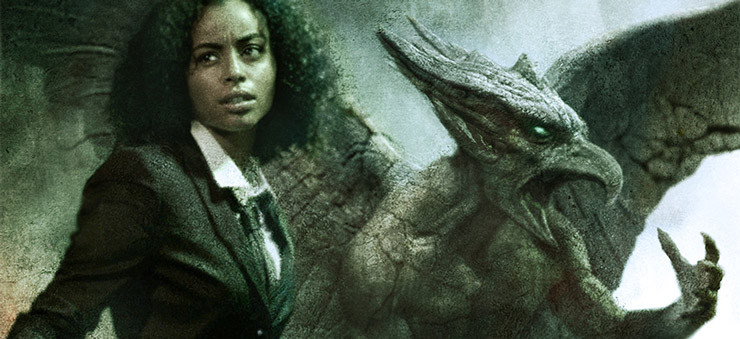It’s a typical morning, as typical as they come. You wake up and shower, listening to your favorite shock jockey blab on the air. You make a cup of coffee and read the paper, all the while keeping an eye on the clock. You hail a cab, and despite the intense traffic, you manage to make your way to work and even manage to impress your boss.
Except that in this world, your shock jockey is a rogue elemental riding the airwaves, spreading gossip. Your cab could be a riderless carriage that touts you around the bustling streets, or possibly a giant dragonfly like creature, whose legs wrap around your body and fly you to work. Your office is probably a giant glass pyramid, fitting into the city like a perfect puzzle piece. And your boss? Yeah, he’s an immortal sorcerer whose constant tampering with the forces of the universe has caused his flesh to fall away, and remain in this life as a skeleton in a business suit, a Deathless King.
Welcome to the Craft Sequence. You’re going to want to pick your jaw up off the floor if you expect to get any respect around here, kid.
In Max Gladstone’s Craft Sequence, which includes the novels Three Parts Dead, Two Serpents Rise, Full Fathom Five, Last First Snow, and the just-released Four Roads Cross, magic is an everyday part of life. It thrums in the spheres of transit, business, society, entertainment, politics, war, and more. It has flooded every avenue and cross-street of the world, but that wasn’t always the case. Before any story in the Craft Sequence starts, there is a cataclysmic event: the God Wars.
Yes, gods live in the world of the Craft…or rather, they did; most of them, anyway. Avatars of justice and flame, moonlight and wind, the sea and the sun, the gods held mostly benevolent dominion over the world. Gods and humanity worked together, until the day they didn’t. Humanity began to tamper with the forces of the universe, of the soul, working and weaving with what would become the Craft. And when the gods reacted in anger and fear, and worked to kill off this discovery of power, humanity and the first Craftsmen struck back. Thus, the God Wars began. Some gods died. Others hid away. Some struck deals. Very few won and live on. Now, Craftsmen and Craftswomen, wielding the Craft with lightning and thorns, with flame and silver, have reclaimed power for humanity and work to keep the world running and free of divine authority.
“The God Wars ended, and we’re living with the world they left.” That’s what Max says on his website, and it’s a great jumping off point in discussing what exactly the Craft books are about. In a post-industrial, post-war setting, Gladstone uses the Craft sequence as his lens to explore anything and everything: faith, religion, families, finance, economics, magic, ambition, youth, gentrification, poetry, boundaries both imagined and real, love, gender, sexuality, and more and more and more…
The world of the Craft is our world, and it is just as rich, diverse, complicated, strange, beautiful, weird, horrifying, heartbreaking, joyous, and amazing as we can imagine and hope our world to be. Replace Big Banks with homemade divinities guaranteed to answer your prayers; replace a young college grad trying to impress on a first assignment at her new firm with a young Craftswoman trying to resurrect a fire god; replace gentrification ripping through the cultural hearts of old cities and neighborhoods with, well, gentrification ripping through the cultural hearts of old cities and neighborhoods. You get the idea.
The Craft Sequence is so damn powerful, because Gladstone is using a secondary world to explore, interrogate, rip apart, and stitch back together modern anxieties and fears: the disillusionment with idols; the anger at the One Percent; the fear of losing our humanity to progress and technology; the willingness to compromise the present for a future that will (hopefully) be better.
So, come on in: dive deep. In Three Parts Dead, the first book in the series, meet Tara Abernathy, the latest graduate of the Hidden Schools of Craft, who maybe just got kicked out and sent back to the world below the clouds. Meet Ms. Elayne Kevarian, senior Craftswoman with the necromantic firm Kelethres, Albrecht, and Ao, who finds Tara, and offers her a job. Meet Abelard, the chain-smoking priest to the fire god, Kos, one of the only surviving deities of the God Wars, who watches his god disappear from the engine that keeps the city running. Meet Cat, who hosts a deconstructed divinity, fueled by justice and cold, who only knows how to run and hurt. For that matter, you can technically start with any of the books in the series—they’re designed to stand on their own, even as they fit together in fascinating and surprising ways.
Meet the Craft Sequence. It’s messy and wonderful and magical and painful, and absolutely worth your while.
Go get ‘em, kid.

Books 1-5 of the Craft Sequence are available now from Tor Books.
Martin Cahill is a contributor to Tor.com, as well as Book Riot and Strange Horizons. He has fiction forthcoming at Beneath Ceaseless Skies and Fireside Fiction. You can follow his musings on Twitter @McflyCahill90. Tweet him about such things as session IPAs for the summer, if you think Flash Season 3 will redeem Season 2, and how excited you are on a scale of 9-10 for N. K. Jemisin’s The Obelisk Gate.










